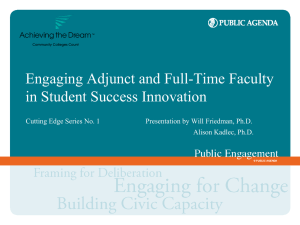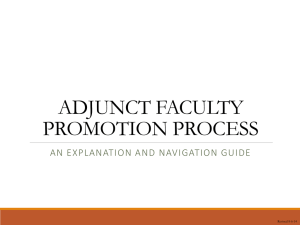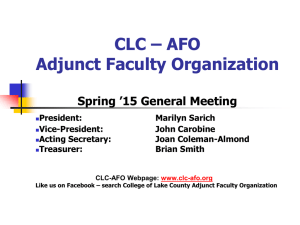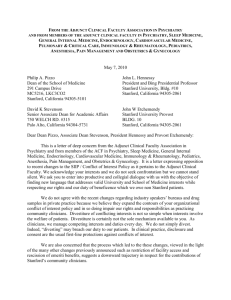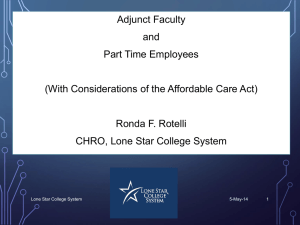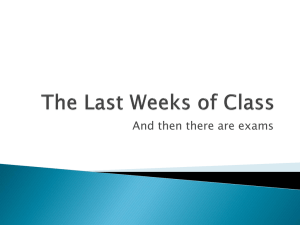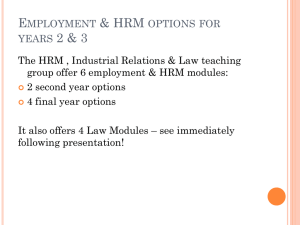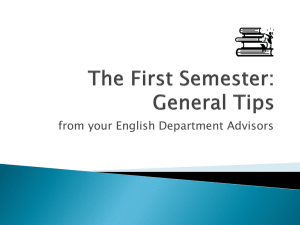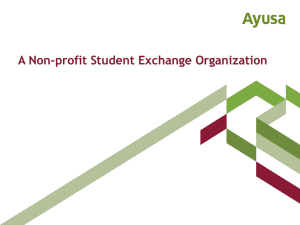Target - Richland College
advertisement
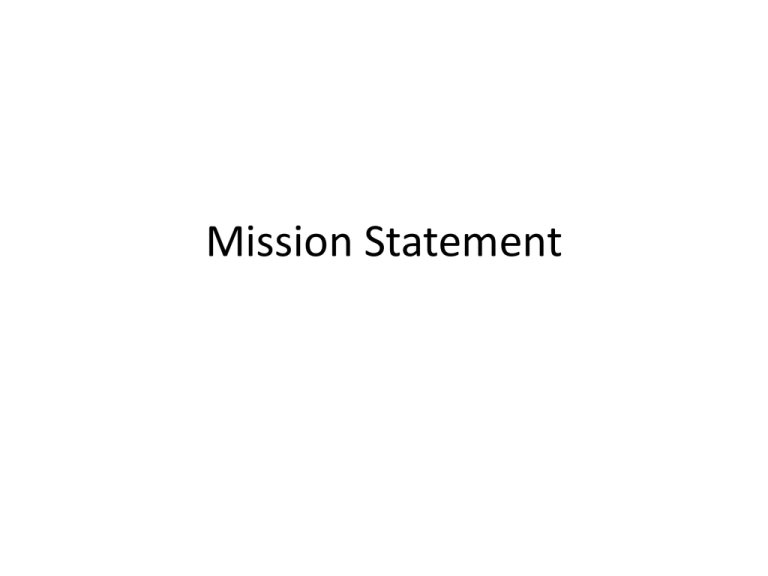
Mission Statement A.C.C.E.S.S. The mission of the A.C.C.E.S.S. Center (Adjunct Faculty College Center and Evening/Weekend Support Services) is to provide information, direction, and support to adjunct faculty to maximize student learning and success. Facilities The mission of Richland College Facilities Services is to provide a clean, safe, comfortable, well-maintained, aesthetically pleasing and environmentally responsible campus in support of teaching, learning, and community building. Multicultural Center • The Multicultural Center promotes the success of students whose native language is other than English or who were born outside the United States. Proposed Change for 2013-14 Mission Statements change to Purpose Statements “In support of the Richland College mission of teaching, learning, community building, the Multicultural Center. . .” Outcomes/Objectives GOALS vs. OBJECTIVES vs OUTCOMES OUTCOMES / OBJECTIVES A.C.C.E.S.S. 1. It is the plan of the ACCESS Center to identify new adjunct faculty to coordinate training needs. 2. All new adjunct faculty will gain access to all DCCCD information systems - e-mail, e-connect, and e-campus. Once the new adjunct instructor completes and submits the e-mail request form, the ACCESS Center staff will work in conjunction with Information Technology to secure a DCCCD e-mail account. Information to log on to e-connect wil also be included in the information packet for new adjunct faculty. The ACCESS Center staff will work with each new adjunct instructor to set a password and familiarize the new instructor with the various services that are offered through e-connect. The ACCESS Center will work in conjuction with the respective school office to order the e-campus course shell fo each new adjunct instructor. In addition, the ACCESS Center will offer free training courses for all adjunct faculty. All grading processes will be recorded in ecampus. OUTCOMES / OBJECTIVES A.C.C.E.S.S. 3. The staff of the ACCESS Center will work in conjunction with the Vice President for Teaching and Learning in the planning and execution of the Fall and Spring Faculty Convocation programs. Objectives vs. Activities The ACCESS office will empower adjunct faculty success through: (1) ensuring new adjuncts are oriented to RLC & trained, (2) ensuring system access for all adjuncts upon hire, (3) execution of effective fall & spring faculty convocation programs. MEASURES and TARGETS MEASURES and TARGETS 1. All new adjunct faculty will participate in the following activites: * Attend the Fall and Spring faculty convocation programs and discipline meetings * Successfully complete the on-line orientation for new adjunct faculty * Review the on-line Adjunct Faculty Handbook * Complete the blue information card, request form for a DCCCD e-mail address, and request form for a locker Information folders will be prepared for all new adjunct faculty and will be available in their respective school offices as well as the ACCESS Center. This information packet will allow new adjunct faculty the opportunity to become familiar with the practices and procedures of the ACCESS Center and Richland College. Target: We anticipate a 95% of all new adjunct faculty will attend the convocation programs. Revision 1. The measure is the number of new faculty attending fall/spring faculty convocation. Target: 95% of all new adjunct faculty will attend the convocation programs. MEASURES and TARGETS 2. The ACCESS Center will measure the number of adjunct faculty that request access to District e-mail AFTER the certification date for each long semester Target: We anticipate a 95% success rate. Revision 2. % of new adjunct faculty who have required system access prior to certification date each long semester. Target: 100% of new adjuncts will have required system access prior to certification date. MEASURES 3. Overall event evaluations (electronic) will be distributed to attendees containing questions that pertain to the specific tasks and duties performed by the ACCESS Center staff. An electronic satisfaction survey is sent out to all faculty and administrators who attended these programs. Target: We anticipate a 95% participation rate. Revision 2. Positive responses to a satisfaction electronic survey administer following convocation. Target: 80% of faculty will rate the convocation positively in regards to execution FINDINGS FINDINGS 1. A total of 114 new adjunct faculty were hired for the 2011-12 academic year. A total of 58 adjunct faculty were hired in the Fall 2011 semester and 56 adjunct faculty were hired in the Spring 2012 semester. For the Fall 2011 Faculty Convocation Program that was held on Thursday evening, August 25th, a total of 55 (95%) new adjunct faculty attended the convocation program. As for the Spring 2012 Faculty Professional Development Program that was held on Thursday evening, January 12th, a total of 53 new adjunct faculty attended the program. We achieved a 95% attendance rate for the Fall 2011 and Spring 2012 faculty convocation programs. Attendance at the faculty convocation programs is highly encouraged for our adjunct faculty. It is especially important for our new adjunct faculty so that they can become familiar with the College, build community with new and continuing faculty, and attend the discipline breakout sessions for interaction and direction with full-time and adjunct faculty. Our target was met and we will continue to monitor this action item Revised FINDINGS • (1) 114 new adjuncts were hired in 2011-12 and 108 (95%) attended convocation. Target met. • (2) 100% of new adjunct faculty had required system access prior to certification date. Target met. • (3) Faculty gave an average rating of 83% for fall and 89% for spring. Target met. ACTION PLANS ACTION PLANS • The ACCESS Center develops and executes the plans for the Fall and Spring faculty convocations. While each semester program is very different, the ACCESS Center assumes the role of planning and execution of those plans for each of these programs. An electronic survey is sent to all faculty, staff, and administrators who attend the programs. We have worked with staff from the Office of Planning and Research for Institutional Effectiveness to develop some questions regarding the role of the ACCESS Center. "Assistance from the ACCESS Center" is now a statement included in the Fall 2012 Faculty Convocation electronic survey. Faculty, staff, and administrators will be encouraged to rate our contributions to the program and to add any comments that can assist us in the future plans for the faculty convocation programs. This statement is included in the Fall 2012 electronic survey and will also be included in the electronic survey for the Spring 2013 Faculty Professional Development Program. Revised ACTION PLANS Staff will work with OPRIE to develop questions on the convocation faculty satisfaction survey related specifically to contributions from the ACCESS Center. Staff will work with division offices to determine feasible methods for tracking # of new faculty who complete online orientation, review online Adjunct Faculty handbook, and complete blue information card as part of ACCESS onboarding. ANALYSIS SUMMARY • HOW EFFECTIVE: Although pass rates for the Course Exit Assignment in online sections were basically unchanged from the previous year, offering the exit test in a secure online environment for those sections did have a small positive effect. If we can continue to build on that and succeed in reducing the number of abstainers, that small change will help to improve our overall success rate. ANALYSIS SUMMARY • NEXT STEPS: We will continue to monitor the rate of student participation in the online testing to see its effect on the number of abstainers. However, we also need to explore other strategies that may also improve student retention and completion rates.
